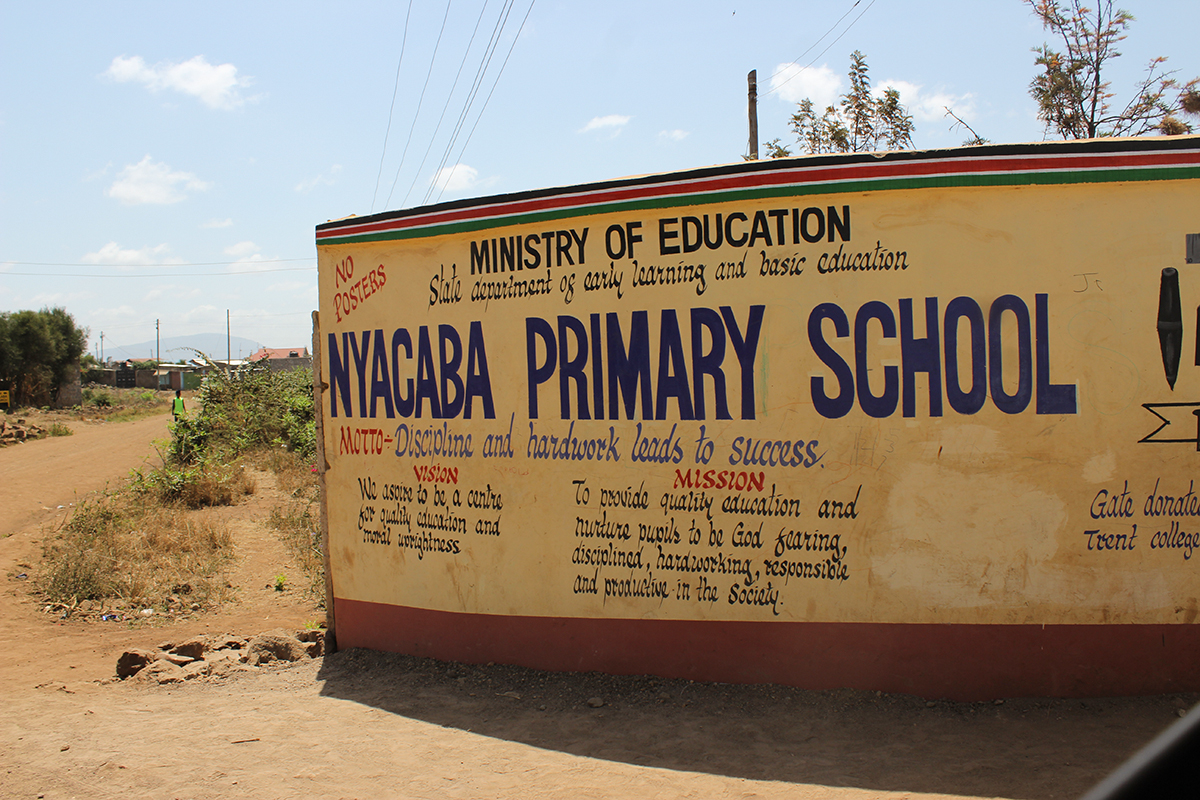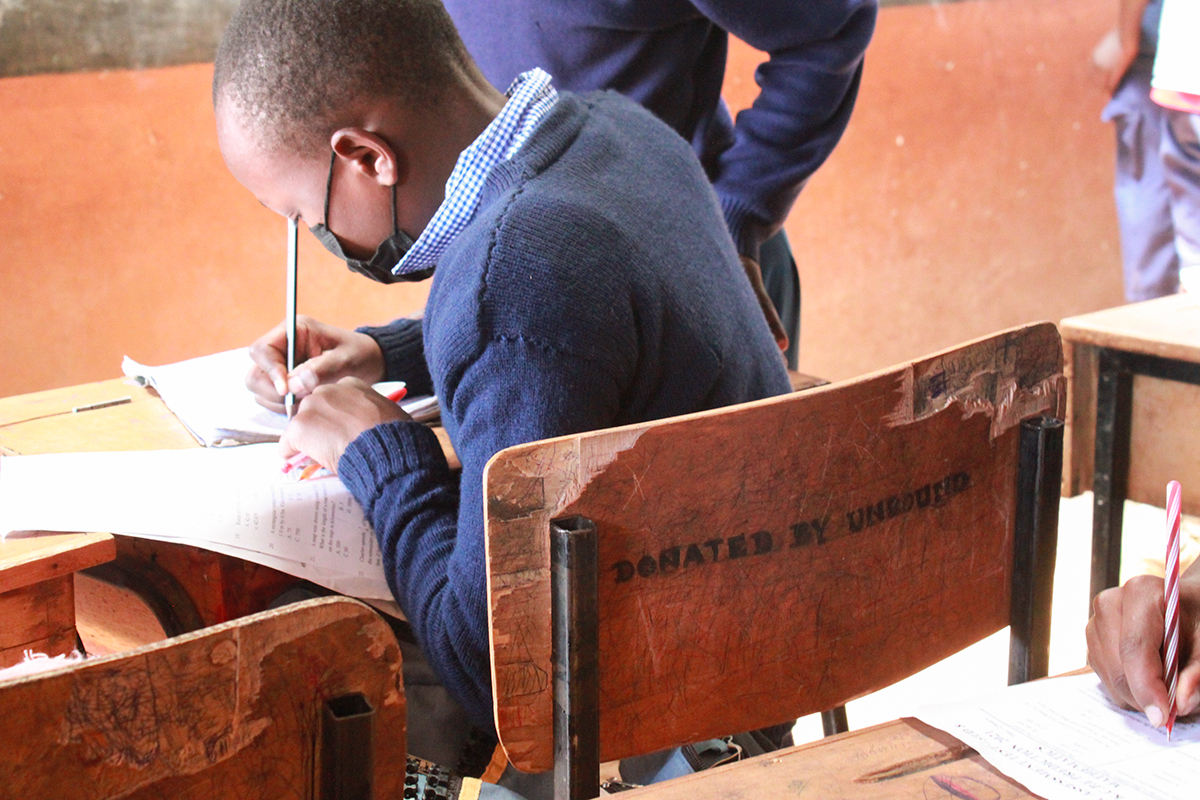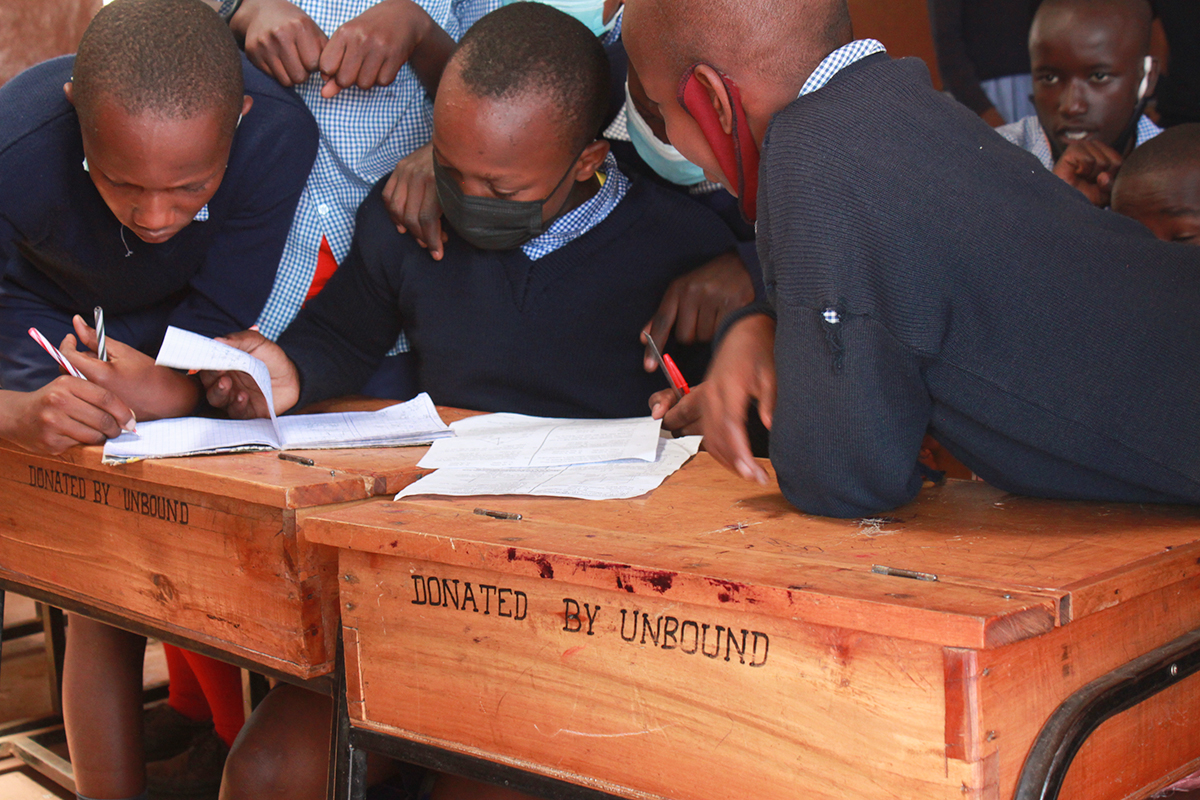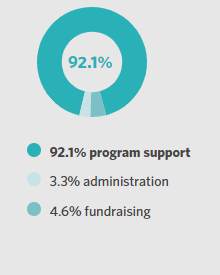In Kenya, a schoolroom desk is often referred to as a “locus.” In its simplest form, “locus” is defined as “a center of activity, attention or concentration.”
For many in the U.S., a “desk” is simply a thing; it is a piece of furniture we sit at or use for storage perhaps because we must in order to complete our day-to-day tasks, and we give little conscious thought to the role its presence plays in our lives.
But in other parts of the world, “locus” reads more like an idea — the center from which meaningful things could potentially occur — so much so that it naturally seems to make sense that a locus could have the ability to change one’s life for the better.
The Nyacaba Victory mothers group in Nairobi immediately recognized the power of the locus in helping to educate their children at Nyacaba Primary School. Spurred on by its absence there, they determinedly set about to improve the educational environment through Unbound’s Agents of Change platform, but their families were not alone in their need.
The Power of a Desk
Agents of Change sets learners up for success in Nairobi
February 13, 2022 | Be Informed

Overcrowded and underfunded are typical descriptions of the education system in Kenya. Nyacaba Primary School in Nairobi serves 1,746 students, mostly from low-income families. With only 26 classrooms, almost every class has more than 90 students per day.
AN EDUCATION SECTOR UNDERFUNDED AND OVERCROWDED
In the U.S., the average class size for public elementary schools is 21 students and 27 students for public secondary schools, according to the National Center for Education Statistics; most recent figures.
In contrast, the national average classroom size in Kenya is about 38 students, with the largest areas of overcrowding being in urban poor areas where there are more students and not enough schools, such as in Nairobi where the average is 40 students per class. Overcrowding in Kenya has been an issue for decades, but most recently experienced an increase in school enrollments by 1.3 million students in a little less than two years when the government introduced free primary education in 2003.
Overcrowding is largely thought to have been the reason behind the deaths of 14 young Kenyan children at a primary school two years ago following a stampede. The average class size there at the time was 60 students per class.
According to Peter Ndungo, project coordinator for Unbound in Nairobi, most public schools are unable to accommodate the large number of learners as the facilities are inadequate because of underfunding.
“Most of our [Unbound] parents can’t afford to take children to private schools; hence the children attend government-funded schools whose infrastructure is of poor standards,” Ndungo said. “Parents have to contribute some funds to help run school programs.”
In educational institutions across Nairobi, Ndungo sees the most funding needs for onsite water storage containments, construction of classrooms, pit latrines and/or kitchens, desks, chairs and tables, feminine hygiene product dispensers, books for libraries, educational supplies and laboratory equipment, among others.
At Nyacaba Primary School, 1,746 students, mostly from low-income families, are served daily. With only 26 classrooms, almost every class has more than 90 students per day. Though a lack of adequate classroom space is an all-encompassing issue for the school, a second big issue is supplying current classrooms with adequate seating for the large number of students.

Magdalene, grandmother of a former Unbound sponsored child, led her mothers group to use an Agents of Change grant to purchase 16 desks and chairs for one class at Nyacaba Primary School, helping students at the overcrowded school be able to sit one to a desk instead of three or four to a desk.
PROMOTING PRODUCTIVITY AND SAFETY WITH A DESK
Magdalene, the legal guardian and grandmother of a former Unbound sponsored child, is a leader in the Nyacaba Victory mothers group. She remembers attending the group meetings held at the Nyacaba Primary School when her granddaughter was still enrolled there and noticing many classrooms with no desks or chairs for the students.
“As parents, we felt the school needed locus and chairs,” said Magdalene, who, along with her husband, is a small-scale farmer in Nairobi. “When we were told that we were going to receive funding [for our project], we really felt happy.”
The funding Magdalene’s mothers group received was the result of an Agents of Change grant they applied for through Unbound once they identified the need in their community that they wanted to address. With the $500 grant, they had 16 desks and chairs made to supply to one class at Nyacaba Primary.
Since 2017, Agents of Change has funded more than 1,000 initiatives across 16 countries. In 2021 alone, Unbound disbursed more than $290,000 in Agents of Change project grant funding. These community-led action plans instill confidence and pride within local groups doing the work, with the knowledge that they are the ones creating better tomorrows for their families and communities. Agents of Change initiatives encompass a wide variety of improvement projects, ranging from making water accessible and improving health care and infrastructure, to reducing education inequity and creating opportunities for better nutrition.
From 2019 to present, Unbound’s Nairobi program has received more than 100 education-related Agents of Change proposals from the community and almost half were selected for funding.
Ndungo said a sizable concentration of Agents of Change projects in Nairobi are geared toward improving the education sector because it’s of particular interest to Unbound mothers groups, since their children attend the schools.
“Agents of Change helps achieve a conducive learning environment for the learners as the missing amenities or facilities are either provided or renovated,” Ndungo said. “It helps needy families to access quality education, meet academic requirements and concentrate in class. … It helps children who are already in the [Unbound] program, [but also], those from the community [who are] not.”
Educational attainment is an important tenet of Unbound’s mission. To be eligible for sponsorship with Unbound, a child or young adult must attend school or participate in vocational training, and the Unbound Scholarship Program offers further funding that helps youth realize their academic potential. A perfect example of how a process like this helps combat poverty is the story of Nickson Ateku, Unbound’s regional reporter in Africa.
Ateku, who was born in rural western Kenya and attended school there under a sponsorship program like Unbound’s, said education is the only sure way of fighting poverty in Kenya. “Apart from the knowledge we get, we acquire skills which are essential for the job market or for self-employment,” said Ateku, who contributed information for this story. “It is through the education I acquired that I am the reporter I am today.”
Past education-related Agents of Change initiatives in Kenya have funded handwashing stations for a primary school, lab equipment that helped secondary school students improve their test scores, sewing machines to teach disabled students in a special unit of a primary school a profitable skill, renovation of a kitchen for a primary school, and the construction of a Play Park and a classroom for nursery students, among others.

Students in class eight at Nyacaba Primary School gather around to review their work atop the desks and chairs provided through an Unbound Agents of Change grant.
KNOWLEDGE POWERS CHANGE
Contemporary poet Marinela Reka once wrote, “Achieving dreams start with small steps but a big vision.” Desks and chairs for a schoolroom seem like a small accomplishment in the face of so much adversity, but humans would be wise to not underestimate the power of simple things in the hands of those with faith and determination.
The head teacher of Nyacaba Primary School, George Mimi, said the school has been overwhelmed with the lack of classrooms per student, however, the addition of the 16 desks and chairs have made things run more smoothly in class eight, where they were placed. Before the new desks and chairs, students were forced to sit three or four to a desk, which was not conducive to classroom learning.
“We are very grateful and happy [for the locus and chairs],” Mimi said. “Before, pupils could not all fit on the desks … [now with the new desks], every pupil is able to sit on his or her own desk.”
The addition of the new desks and chairs has enabled the students to be able to study well. According to Mimi, student performance at the school has improved also, with last year’s scores in class eight being some of the highest in the school’s history.
“This year, [the scores] are promising…” he said. “We shall not look back … we are going to improve … [the students] are determined to do their best.”
Magdalene said the smaller number of students per desk will make for a safer classroom. In addition, the lockable nature of the desks allows students to store their books and school supplies under lock and key, easing worries about the safety of their items while at school. “We feel honored to have received this funding,” she said. “It feels nice, giving mothers such an opportunity to work on a project … they will feel like they own it. I feel like a leader, and I will continue leading.”
Agents of Change is a stark reminder that all a poverty-stricken community needs to boost their potential is a small grant, a little bit of faith in their abilities and access to the right resources to light their paths forward.
See more Agents of Change stories on how communities are self-directing their own paths out of poverty and learn how you can help fund an Agents of Change initiative.
Agents of Change helps achieve a conducive learning environment. … It helps needy families to access quality education, meet academic requirements and concentrate in class.
— Peter Ndungo, Coordinator of Unbound’s Nairobi program













